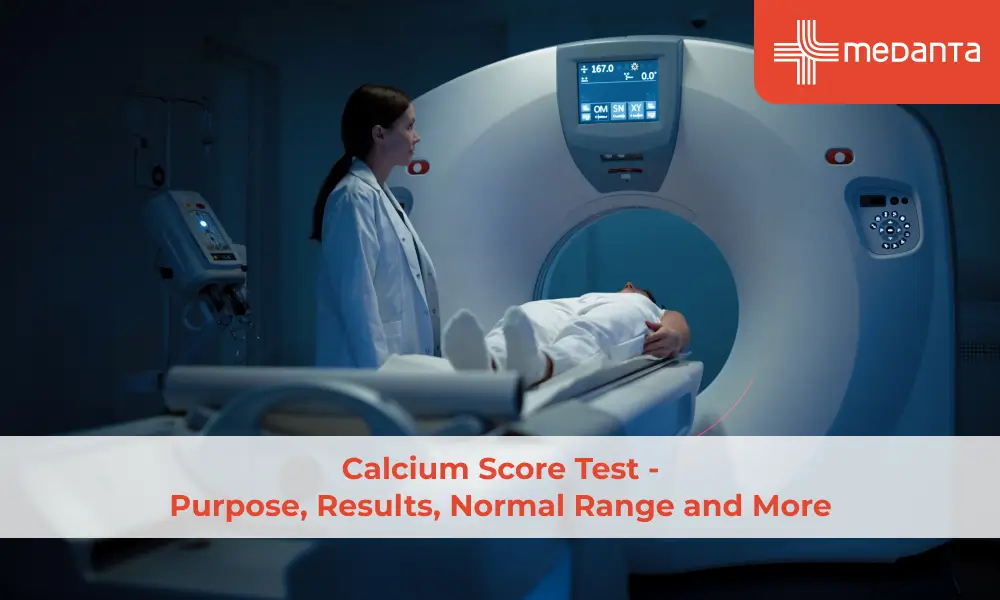Calcium Score Test - Purpose, Results, Normal Range and More

TABLE OF CONTENTS
A calcium score test gives an explanation of your heart's health by finding calcium buildup in your coronary arteries. Calcium deposits in these arteries point to dangerous plaque that raises your heart attack risk. This simple, non-invasive heart scan uses computerised tomography (CT) imaging to take detailed pictures of your heart's arteries.
Your coronary calcium scan results come as a number score. Doctors call it normal if you score zero, which means you have a very low risk of heart attacks in the next few years. Any score above zero shows signs of coronary artery disease (CAD). Scores from 100 to 300 mean you have moderate plaque deposits and face higher risks of heart issues in the next 3 to 5 years. This is a big deal as it means that 300 points signals extensive plaque deposits and puts you at very high risk of a heart attack.
Your calcium score and age-related normal ranges help doctors make better treatment choices. Higher scores indicate more severe disease and greater risks.
This article covers everything you should know about cardiac calcium score tests, from getting ready to understanding results.
What Is a Normal Calcium Score by Age?
Zero is the perfect calcium score at any age, which shows no calcified plaque exists. All the same, calcium scores usually go up as we age. Men in their late 60s who score 313 rank higher than 75% of their peers. Women the same age need a score of 104 to reach that 75th percentile. Men typically show higher calcium scores than women.
Race plays a role, too - black people show lower scores than white people.
What Happens After the Calcium Score Test?
Your doctor will look at your results along with your complete health picture. Your score might lead them to suggest:
Starting statins to control cholesterol
Changes to diet and exercise habits
More heart tests
Target weight goals
Regular check-ups to track changes
A zero score means your heart attack risk stays very low for the next 2-5 years. Scores above 400 signal high risk and need immediate medical attention.
Limitations of the Calcium Score Test
Spots only calcified plaque, misses soft plaque and blockages
Can't measure blood flow or heart function
Uses radiation, though just a small amount
Not safe for pregnant women
Results aren't as reliable in people under 40
A zero score might be misleading since some heart problems can still exist
Benefits of the Calcium Score Test
Quick, painless test that takes 10-15 minutes
You can go home right after the test
Catches early warning signs of heart disease
Makes risk predictions more accurate when combined with other factors
Helps doctors plan preventive treatments better
Gives better risk assessment for medium-risk patients
Conclusion
Calcium score tests are a great way to get insights about heart health and predict future cardiovascular risks. These simple scans give doctors vital information about arterial calcification that might stay hidden until a serious cardiac event occurs. A score of zero shows the best outcome, but higher scores don't mean a heart attack is coming soon - they just indicate you need preventive care.
These tests work best as part of a complete health check. Your doctor looks at your calcium score among other things like age, family history, and lifestyle habits. The test can substantially improve risk assessment and treatment choices, especially for patients with moderate risk profiles.
You should know the limits of calcium scoring. The test can't detect soft plaque or check blood flow, so you might need extra testing even with good results.
The path to heart health needs proactive steps, and calcium scoring is a powerful first move. Talk to your doctor about this test if you worry about your heart health. Early intervention can mean the difference between life and death with cardiac disease. This quick, non-invasive procedure could then be one of the most crucial fifteen minutes you spend on your health.
FAQs
Is the calcium score test painful?
Many patients worry about pain during a calcium score test. The good news is that the procedure doesn't hurt at all. The test only requires you to lie on your back while the scanner captures images of your heart. The process needs no needles, contrast dye, or invasive procedures. The test proves quite simple if you get anxious about medical procedures - you won't feel a thing during the scan.
How long does the calcium score test take?
A calcium scoring procedure usually takes 10-15 minutes. The actual scanning lasts just a few minutes, but your appointment might run 20-30 minutes with preparation time. You will need to hold your breath for a few seconds to get clear images. This quick test gives valuable information without taking up much time.
What are the risks of the calcium score test?
Radiation exposure remains the main risk, though the dose equals what you'd naturally get in a year. The radiation level stays lower than standard CT scans. The test might occasionally reveal findings that need more testing. People under 40 face a slight increase in cancer risk from repeated exposure. The test isn't safe for pregnant women because of potential risks to the baby.
How should I prepare for the calcium score test?
The preparation stays simple:
Stay away from caffeine and tobacco for four hours before testing.
Your doctor might ask you to avoid food and drinks except water for 4-6 hours before.
Choose comfortable clothes without metal since it affects the imaging.
Make sure to take off jewellery, glasses, and other metal items.
Getting there 15-20 minutes early helps with paperwork completion.
Can I go home the same day after the calcium score test?
You can head home right after the test. The test doesn't need recovery time since it's non-invasive and uses no contrast dye. You can drive yourself and get back to your normal routine right away. This heart test fits easily into your daily schedule without any disruption.






